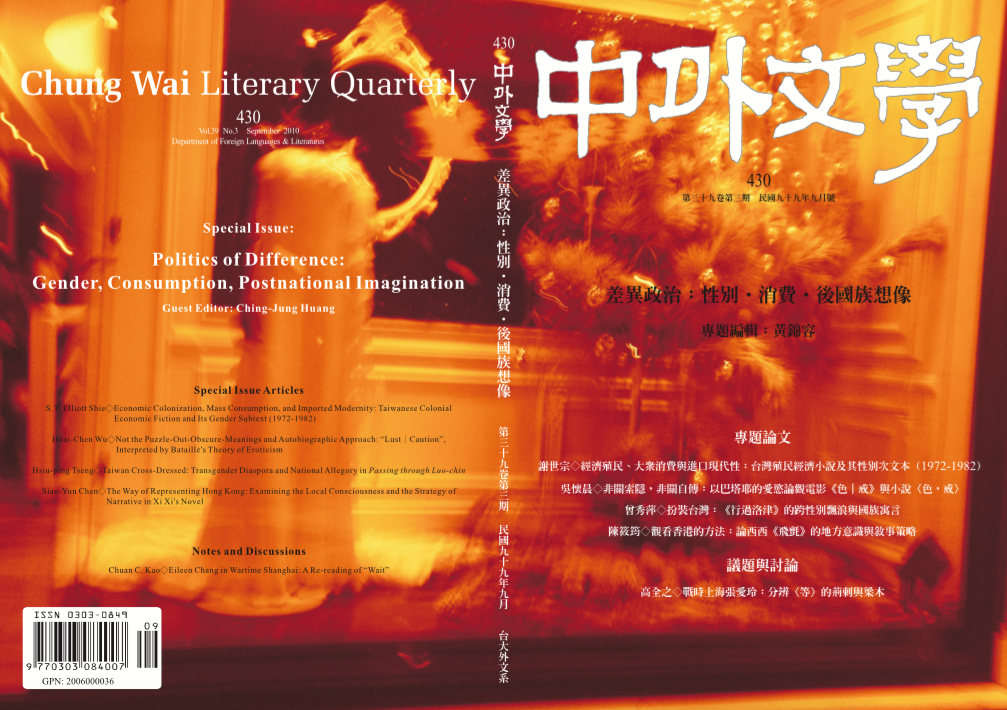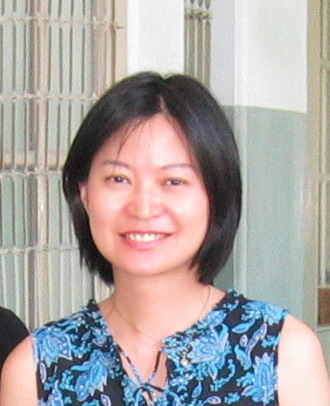第三十九卷 第三期 總430 中華民國99年9月
Vol.39 No.2 September 2010

《中外文學》九月號推出「差異政治:性別‧消費‧後國族想像」專輯,由政大日文系黃錦容教授擔任專題編輯。本專輯收錄了四篇精彩論文:謝世宗探討1972-1982年幾部戰後台灣小說中的消費議題,指出小說傳達的男性國族意識,及其經濟論述上銘刻的性別次文本;吳懷晨援用法國思想家巴塔耶(Georges Bataille)的愛欲理論來解析李安的電影《色∣戒》和張愛玲的小說〈色,戒〉,認為愛欲(色)乃人類在禁忌(戒)之後特有的神聖內在經驗;曾秀萍主張施叔青的《行過洛津》透過小說主角許情在戲曲和生活中的性別操演,展現複雜的身分認同、性別流動與家國想像;陳筱筠則以香港作家西西的小說《飛氈》為例,批判香港長期被論述的傷痛、匱乏特質,並強調日常生活經驗發展出的獨特性。除了四篇專題論文,本期亦刊登資深文評家高全之先生的新作〈戰時上海張愛玲:分辨〈等〉的荊刺與梁木〉,其文對張愛玲短篇小說〈等〉的幾個中英文版本進行了詳細的考辨研究。
中外文學九月號目錄
Contents
專題論文
Special Issue Articles
謝世宗╱經濟殖民、大眾消費與進口現代性: 台灣殖民經濟小說及其性別次文本(1972-1982)
經濟殖民、大眾消費與進口現代性
台灣殖民經濟小說及其性別次文本(1972-1982)
謝世宗*
摘要
◎關鍵詞:經濟殖民,商品,消費,性別,現代性,台灣殖民經濟小說
★國立清華大學台灣文學研究所助理教授。
S.T. Elliott Shie╱Economic Colonization, Mass Consumption, and Imported Modernity: Taiwanese Colonial Economic Fiction and Its Gender Subtext (1972-1982)
Economic Colonization, Mass Consumption, and Imported Modernity
Taiwanese Colonial Economic Fiction and Its Gender Subtext (1972-1982)
S.T. Elliott Shie*
Abstract
◎Keywords: economic colonization, consumption, modernity, gender, Taiwanese fiction
★Assistant Professor, Graduate Institute of Taiwan Literature, National Tsing Hua University.
吳懷晨╱非關索隱,非關自傳: 以巴塔耶的愛慾論觀電影《色∣戒》與小說〈色,戒〉
非關索隱,非關自傳
以巴塔耶的愛慾論觀電影《色∣戒》與小說〈色,戒〉
吳懷晨*
摘要
但筆者試以法國思想家巴塔耶的愛慾論闡發論說《色∣戒》(電影)與〈色,戒〉(小說)的思想精義。巴塔耶認為,人類特有的「死亡禁忌」與「性禁忌」乃「神聖世界」與「世俗世界」之中介,通過了死亡與性禁忌,人類將由有秩序的俗世界之中「越界」(transgress)到聖世界。故愛慾(色)乃是人類在禁忌(戒)之後特有的神聖/神秘之內在經驗。最後,筆者將主張,李安《色∣戒》有其「色相」之一面,故內蘊「為世所戒」的思想,屬於東方式的世故與了然,從而超出了愛慾論的疆界。
◎關鍵詞:色戒,巴塔耶,愛慾論,禁忌,死亡,性,色相
★國立台北藝術大學共同學科助理教授。
Huai-Chen Wu╱Not the Puzzle-Out-Obscure-Meanings and Autobiographic Approach: “Lust∣Caution”, Interpreted by Bataille’s Theory of Eroticism
Not the Puzzle-Out-Obscure-Meanings and Autobiographic Approach
“Lust∣Caution”, Interpreted by Bataille’s Theory of Eroticism
Huai-Chen Wu*
Abstract
◎Keywords: “Lust∣Caution”, Bataille, eroticism, taboo, sex, death, material appearance
★ Assistant Professor, Department of General Education, Taipei National University of the Arts.
曾秀萍╱扮裝台灣: 《行過洛津》的跨性別飄浪與國族寓言
扮裝台灣
《行過洛津》的跨性別飄浪與國族寓言
曾秀萍*
摘要
◎關鍵詞:跨性別,台灣,國族寓言,離散,飄浪,敘事,擬說書,扮裝,國族論述
★國立政治大學中國文學系博士候選人。
Hsiu-ping Tseng╱Taiwan Cross-Dressed: Transgender Diaspora and National Allegory in Passing through Luo-chin
Taiwan Cross-Dressed
Transgender Diaspora and National Allegory in Passing through Luo-chin
Hsiu-ping Tseng*
Abstract
This article argues that Shu-ching Shih’s novel Passing through Luo-chin demonstrates a complexity of identities, fluid gender, and the national imaginary through the gender performativity of the protagonist, a male actor playing the part of woman during the Qing period. Attentive to the protagonist’s cross-dressing and the narrative strategy of the novel, this presentation analyzes the novel’s multiple relations with the national allegory. Inspired by Judith Butler’s theory of gender performativity and Fredric Jameson’s discussion of national allegory, this presentation relates the novel to Chinese opera and Chinese classic fiction, situates it in Taiwan’s colonial history, and identifies its political metaphors of Taiwan.
Adopting the style of “storytelling” narrative tactics which I call “simulated storytelling” (ni-shuo-shu), Passing through Luo-chin not only successfully represents the protagonist’s “transgender diaspora”—a unique and difficult means of expressing self-identity, self-reflexivity, and self-positioning, but also reflects the diverse facets of working-class Taiwanese society and the national imaginary. With a critical view similar to that of transgender studies, the novel can also be read as a criticism of the preoccupation with heteronormative masculinity and the reproductivist family. Passing through Luo-chin suggests a certain connection of affect as an alternative way out for the socially marginalized characters to position themselves in the diaspora and redress their personal and national identities. In addition to delineating the possibilities and difficulties of gender- and identity-crossing and the fluidity of affect and identities, Passing through Luo-chin also provides multiple perspectives and reflexivity on the national imaginary.
◎Keywords: diaspora, transgender, cross-dressing, national allegory, Chinese opera, storytelling, narrative, Taiwan, Shu-ching Shih (Shi Shuqing)
★Ph.D. Candidate, Department of Chinese Literature, National Chengchi University.
陳筱筠╱觀看香港的方法: 論西西《飛氈》的地方意識與敘事策略
觀看香港的方法
論西西《飛氈》的地方意識與敘事策略
陳筱筠*
摘要
◎關鍵詞:西西,《飛氈》,敘事策略,日常生活,地理疆界
★國立成功大學台灣文學系博士生。
Siao-Yun Chen╱The Way of Representing Hong Kong: Examining the Local Consciousness and the Strategy of Narrative in Xi Xi’s Novel
The Way of Representing Hong Kong
Examining the Local Consciousness and the Strategy of Narrative in Xi Xi’s Novel
Siao-Yun Chen*
Abstract
◎Keywords: Xi Xi, Flying Carpet ,strategy of narrative, everyday life, boundary of geography
★Ph.D. Student, Department of Taiwanese Literature, National Cheng Kung University.
議題與討論
Notes and Discussions
- 高全之╱戰時上海張愛玲:分辨〈等〉的荊刺與梁木
Chuan C. Kao╱Eileen Chang in Wartime Shanghai: A Re-reading of “Wait”


